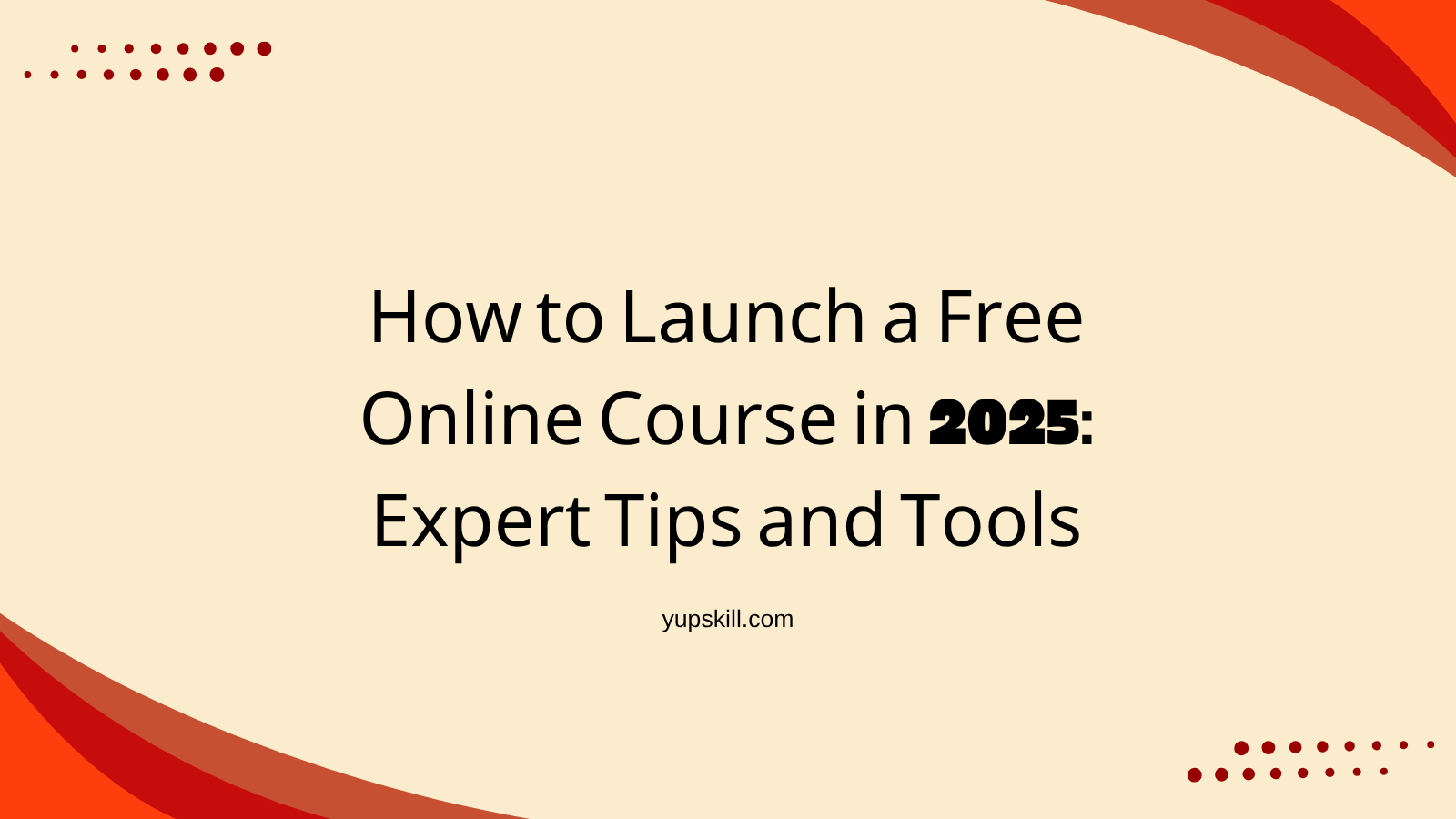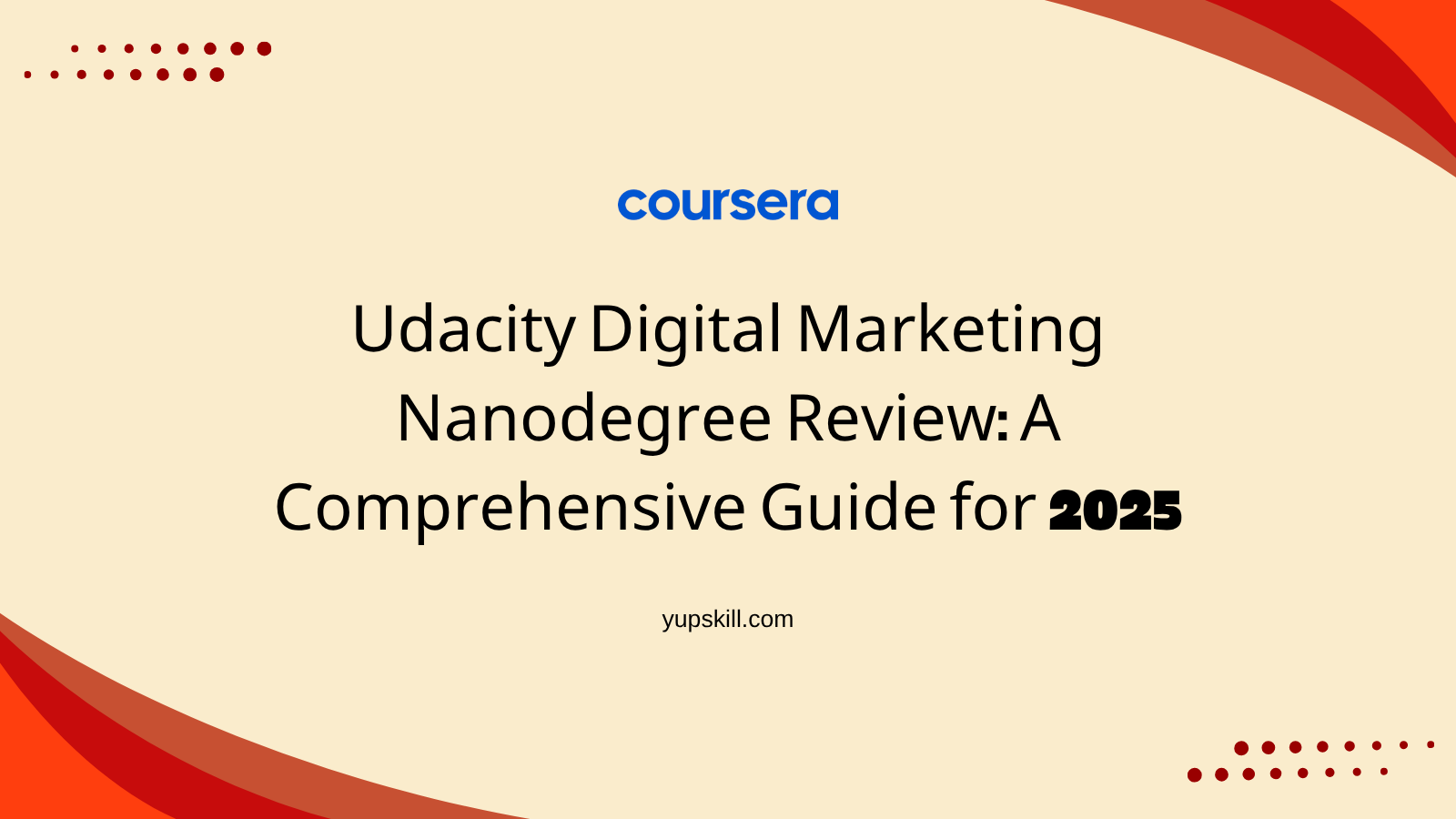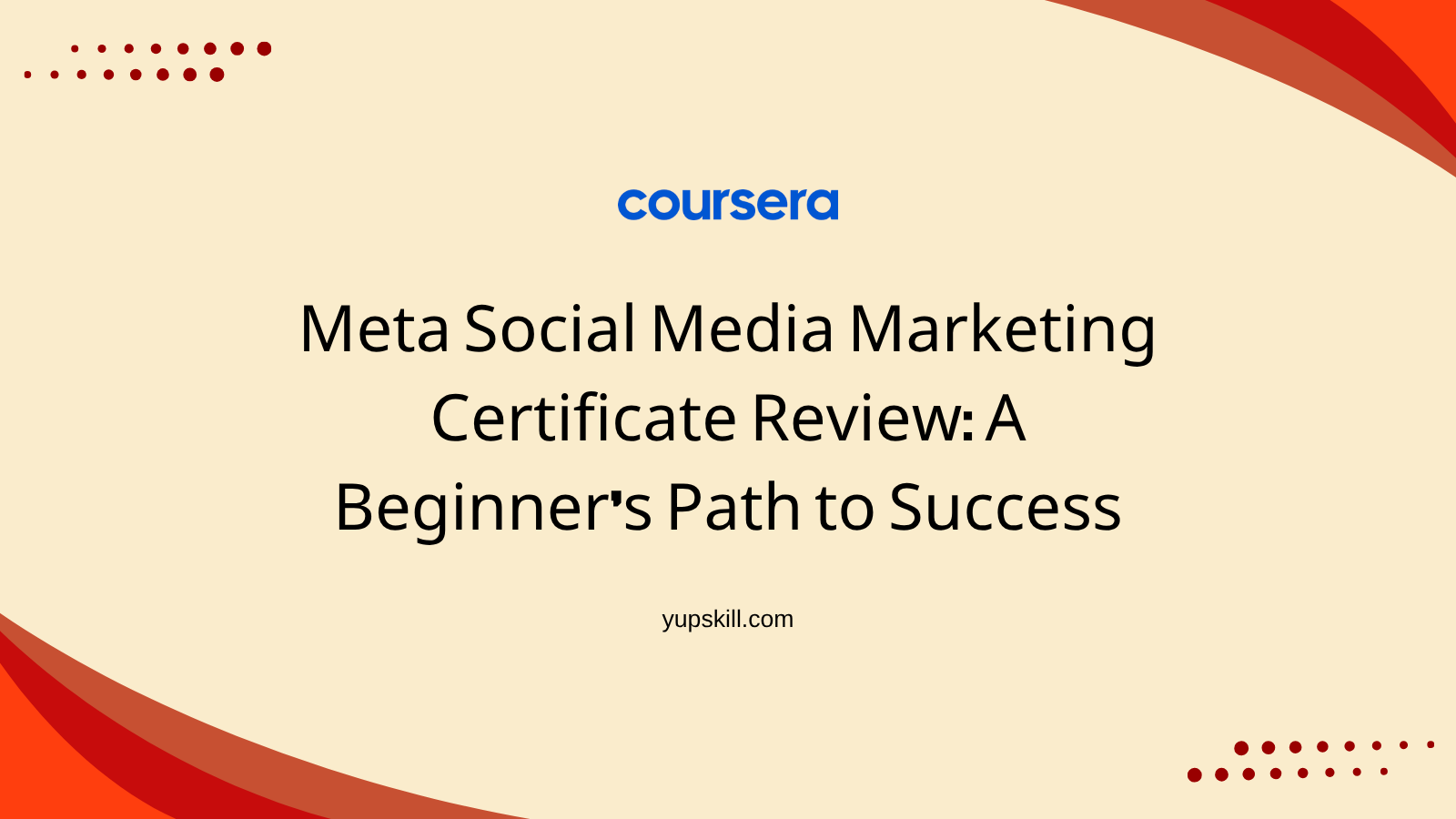Online education has become an essential part of learning in today’s digital world. With the abundance of online learning platforms available, it can be difficult to determine which one is the best fit for your needs. Two of the most popular platforms—Educative and Udemy—offer a wide variety of courses, but they differ significantly in terms of course content, teaching methods, pricing models, and overall learning experience.
In this detailed comparison, we will break down these key aspects of both platforms, so you can make an informed decision based on your learning style, goals, and budget.
Overview Of Udemy
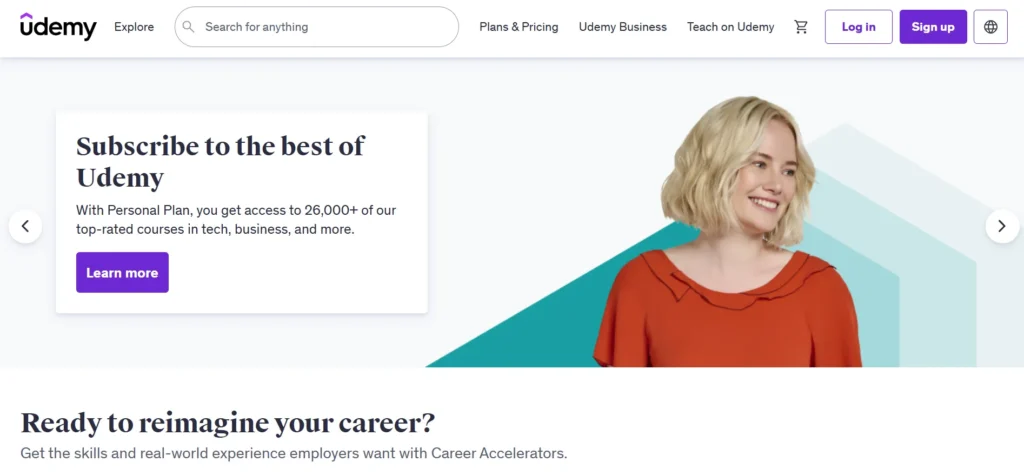
Udemy is a leading online learning platform offering a vast library of over 200,000 courses across various topics, including technology, business, personal development, and creative arts. It operates on a pay-per-course model, with prices often discounted. Courses are primarily video-based and feature supplementary quizzes, assignments, and resources.
Anyone can create and sell a course, making the platform diverse but also varied in quality. Udemy allows learners to learn at their own pace, with lifetime access to purchased courses. While widely recognized, it may not provide the same hands-on learning experience as more specialized platforms.
Overview Of Educative
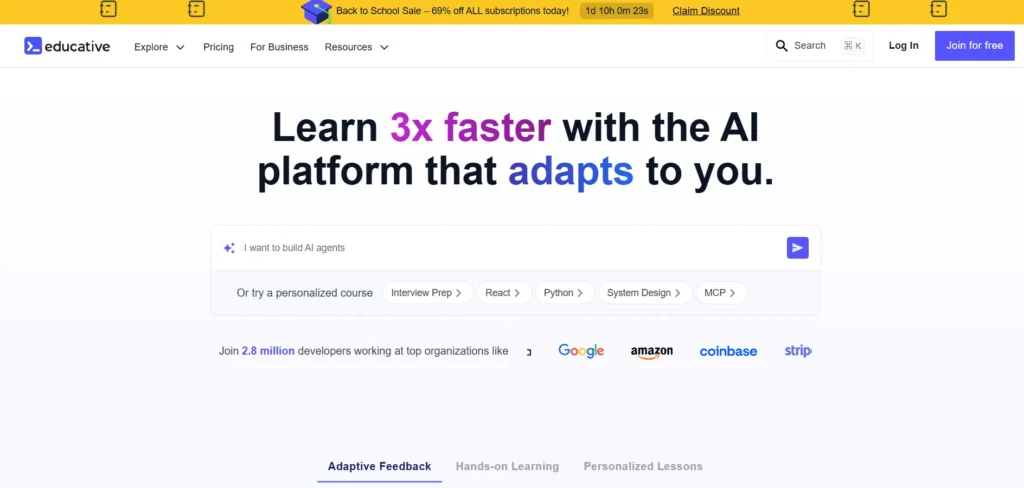
Educative is an online learning platform focused on tech and programming subjects, offering courses in areas like software development, data science, and system design. Unlike traditional video-based platforms, Educative emphasizes interactive, text-based content with in-browser coding environments, enabling learners to write and test code directly within the platform. This hands-on approach fosters practical learning, especially for technical topics.
With a subscription model, Educative provides access to all courses, ensuring consistent quality and structured learning paths. Ideal for learners seeking in-depth, career-oriented education in tech fields, Educative offers a more immersive and engaging experience compared to traditional video platforms.
1. Course Variety
The first major point of difference between Educative and Udemy is the variety of courses available.
Udemy

Udemy has a vast course catalog that spans over 200,000 courses across a broad range of subjects. From tech and business to personal development and lifestyle, Udemy offers something for everyone. Whether you are looking to learn how to code, improve your communication skills, or explore new hobbies, Udemy likely has a course for it.
The courses on Udemy are diverse in terms of the fields they cover, and this variety is both a strength and a weakness. On one hand, it gives learners a tremendous amount of choice, allowing them to explore different topics. On the other hand, the sheer size of the catalog means that the quality of courses can vary significantly. Anyone can create and sell a course on Udemy, so you might find a few excellent courses, but you may also encounter poorly designed or low-quality courses.
Educative
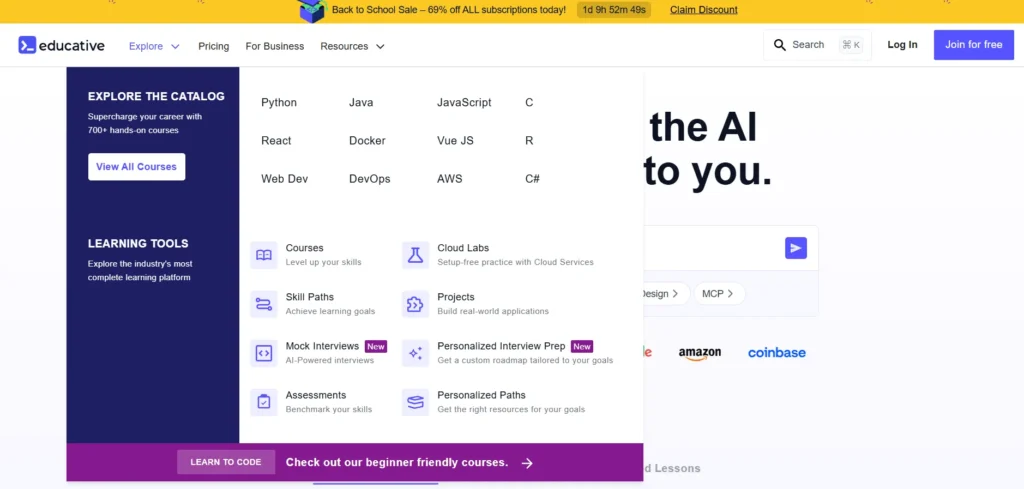
Educative, in contrast, is much more focused. It specializes primarily in tech-related topics like programming, software development, data science, machine learning, and system design. If you are looking for deep, structured courses in these fields, Educative excels in providing high-quality content. However, Educative’s course offerings are not as broad as Udemy’s. If you are looking for courses on non-technical subjects, Educative might not be the platform for you.
The targeted nature of Educative’s course offerings is a big advantage if you are someone who wants to pursue a technical career and needs high-quality, in-depth content on those specific topics. However, if you prefer a broader learning experience or wish to learn a wide range of subjects, Udemy will be the better fit.
2. Course Quality
When it comes to the quality of courses, there is a notable difference between the two platforms.
Udemy
Udemy allows anyone to create and publish a course. While this democratizes the process, it also means there can be a wide variation in course quality. Some courses are top-notch, created by industry experts, while others may lack sufficient depth, proper structure, or professional teaching techniques. Before enrolling in a course, it’s important to check the reviews, ratings, and course preview to ensure that it meets your expectations.
The fact that Udemy offers such a broad variety of courses can also make it overwhelming to choose the best one. Some courses might seem outdated or irrelevant to current trends, and you could find that the content is not up to the standard you expect. However, Udemy does allow students to leave reviews, and ratings can help you find courses that are highly regarded by others.
Educative
Educative, on the other hand, has a more curated approach to course creation. They focus on providing high-quality, structured content developed by experienced instructors. Since Educative specializes in technical fields, the platform ensures that all of its courses are designed by industry professionals and experts in the field. The quality is consistently high, which ensures that learners receive content that is both accurate and relevant.
Educative also emphasizes interactive, hands-on learning, which is beneficial for students who prefer to learn through practice rather than just watching videos. This creates a more engaging and effective learning experience, especially for technical topics like coding and software development.
3. Learning Experience
The learning experience on both platforms is different and caters to distinct types of learners.
Udemy
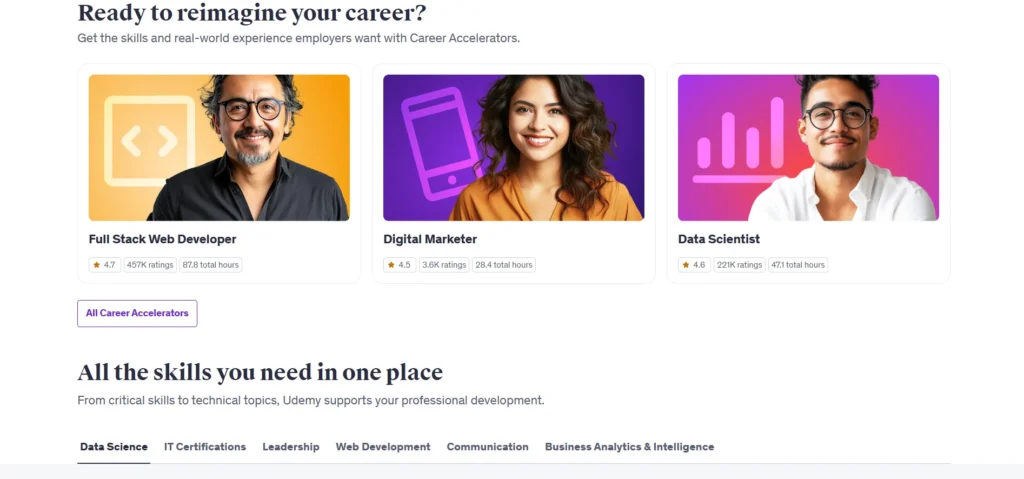
Udemy’s learning experience is mainly video-based. Each course typically consists of a series of video lectures, with quizzes and assignments interspersed to reinforce learning. For many learners, this format is appealing as it allows them to watch the content at their own pace, pause and replay videos as needed, and absorb information in an easy-to-follow manner. However, Udemy’s video-heavy format can also be a drawback for some, particularly those who prefer hands-on learning and interactive exercises.
While Udemy does offer downloadable resources, assignments, and certificates upon completion, it doesn’t have as much of a hands-on component for practical application, especially in technical subjects. As a result, learners are often required to set up their own development environments if they wish to practice coding, for instance.
Educative
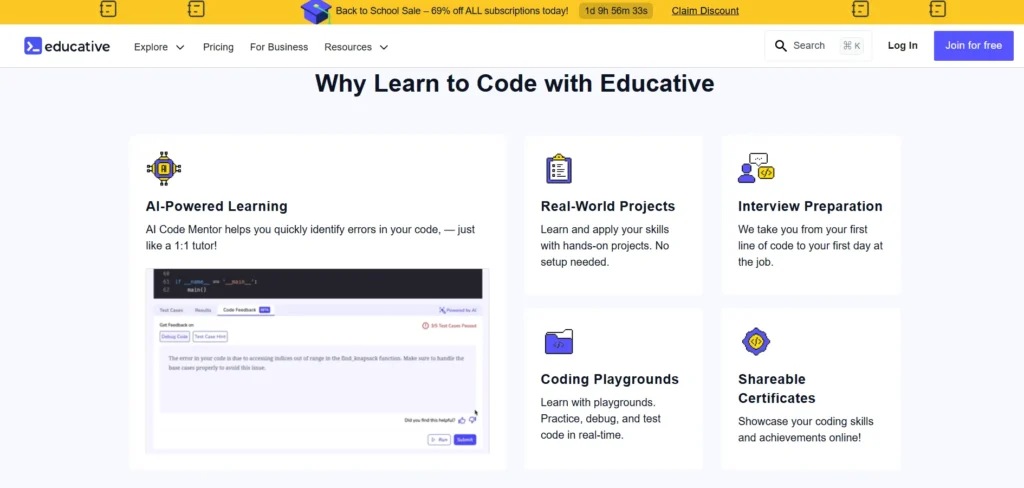
Educative, on the other hand, takes a more hands-on, interactive approach to learning. Instead of relying solely on video lectures, Educative’s courses use text-based content with embedded interactive coding environments. This allows students to write, run, and test code directly within the platform as they learn. This interactive learning format is highly effective for technical subjects, as it offers a more engaging and practical way to learn, especially for beginners.
Educative also provides a more structured and guided learning experience. Rather than simply watching videos and completing assignments at the end of a course, Educative’s courses are designed to take students through a series of carefully constructed lessons that build on each other. This ensures that learners grasp foundational concepts before moving on to more complex topics.
If you’re someone who learns best by doing rather than just watching videos, Educative’s interactive learning style will likely be a better fit. However, if you prefer a more traditional, video-based approach, Udemy offers a learning experience that is easier to digest and flexible in terms of scheduling.
4. Pricing Models
Both platforms have different pricing models that cater to different types of learners.
Udemy
Udemy operates on a pay-per-course model. This means that you purchase individual courses for a one-time fee. Course prices on Udemy typically range from $10 to $200, depending on the course’s length and complexity. However, Udemy frequently runs sales and offers substantial discounts on courses, often bringing prices down to as low as $9.99. This can be an attractive option for learners who only want to take one or two courses and do not want to commit to a subscription.
The downside of Udemy’s pricing model is that the costs can add up quickly if you plan to take many courses. While the individual courses are often affordable, paying for each course separately can be more expensive in the long run than subscribing to a platform that offers access to all content for a flat monthly fee.
Educative
Educative, on the other hand, operates on a subscription model. For a monthly fee of $14.99 (as of 2025), learners gain access to all of Educative’s courses. This pricing model can be more cost-effective if you plan to take multiple courses on Educative, as you have unlimited access to all content with your subscription. The flat fee also provides more value for learners who want to explore a variety of technical topics without worrying about the cost of individual courses.
While Educative’s subscription model offers flexibility in terms of content access, it’s important to note that it focuses only on technical subjects. If you’re looking to explore topics outside of programming, software development, or data science, you may not find Educative to be as valuable as Udemy.
5. Instructor Expertise
The quality of instructors is a significant factor when evaluating online learning platforms.
Udemy
Udemy allows anyone to create a course and sell it on the platform. As a result, instructors come from various backgrounds, and their levels of expertise can vary. Some instructors are well-established industry professionals with years of experience, while others may not have as much practical experience or teaching expertise. This open marketplace model means that students need to pay extra attention to course reviews, ratings, and the credentials of the instructors before enrolling in a course.
Educative
Educative, in contrast, takes a more selective approach to course creation. All of Educative’s courses are developed by industry professionals who have considerable experience in their respective fields. Educative’s instructors are experts in their areas of focus, and they have a deep understanding of the subject matter. This ensures that learners receive high-quality instruction from professionals who know the ins and outs of the topics being taught.
Because Educative places a strong emphasis on instructor expertise and hands-on learning, students can expect a more cohesive and professional learning experience. If you’re looking for in-depth, technical content delivered by experts, Educative is likely the better option.
6. Support and Community Engagement
Both Educative and Udemy offer some level of student support, but they differ in terms of community engagement and interaction.
Udemy
Udemy provides access to discussion forums for each course, where students can ask questions and interact with both instructors and other learners. However, the level of engagement in these forums can vary. Some instructors actively participate in discussions and answer questions, while others may not be as involved. Additionally, since Udemy courses are often self-paced, the sense of community can sometimes feel fragmented or impersonal.
Educative
Educative fosters a more interactive learning environment with built-in support features. Educative’s in-browser coding environment allows students to get real-time feedback on their code, and they can also access the platform’s community forums to ask questions and engage with other learners. Educative’s focus on interactive, hands-on learning also encourages students to actively participate and collaborate with others, creating a more dynamic and engaging community experience.
While both platforms offer support, Educative’s emphasis on interactivity and community involvement provides a more immersive learning experience, especially for students who thrive in a collaborative environment.
7. Mobile Learning
Udemy
Udemy offers mobile apps for both iOS and Android, which means that learners can access their courses on the go. The mobile app allows users to download course videos for offline viewing, track their progress, and engage with quizzes and assignments. This makes it easy to continue learning even when you’re not at your computer.
Educative
Educative also offers a mobile app, but the mobile experience is somewhat limited compared to Udemy. While you can access course materials and track your progress on mobile, the platform’s in-browser coding environments are best experienced on a desktop or laptop. Therefore, if you’re primarily looking for a mobile learning experience, Udemy’s app will likely offer more flexibility and functionality.
8. Certification and Career Support
Both platforms offer certificates of completion, but there are differences in how they approach career support.
Udemy
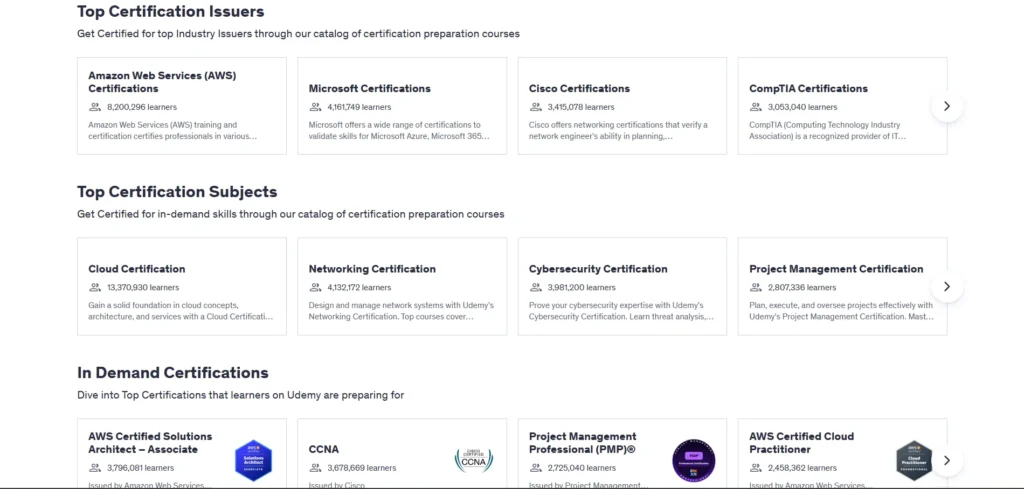
Udemy offers a certificate upon completion of a course, which can be shared on platforms like LinkedIn. However, these certificates are generally not recognized by employers as an official credential. While they can demonstrate your commitment to learning, they don’t carry the same weight as a degree or industry-recognized certification.
Educative
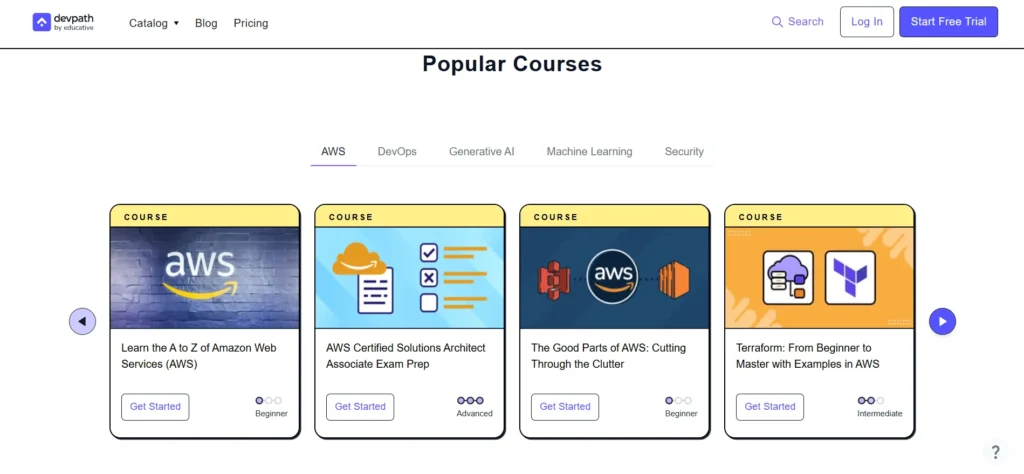
Educative, on the other hand, offers more comprehensive career support. Educative’s courses are designed to help learners build real-world skills, and the platform provides personalized learning paths, hands-on projects, and career-focused courses. Educative also offers a more structured learning experience, which helps learners develop portfolios of projects they can showcase to potential employers. While Educative’s certificates are not formally accredited, the skills and experience gained from completing Educative’s courses can be valuable in the job market.
Conclusion
Choosing between Educative and Udemy ultimately depends on your personal learning style, goals, and budget.
Udemy is ideal for learners who want a broad range of topics and enjoy a video-based, flexible learning experience. It’s great for those who prefer to learn at their own pace and are looking for affordable, one-time courses in various subjects. However, the course quality can vary, and the platform may not offer the in-depth, hands-on learning experience that many technical learners crave.
Educative is better suited for those who are serious about developing technical skills in areas like programming, software development, and data science. The interactive, hands-on learning format and curated course offerings ensure a higher level of consistency and quality. The subscription-based model makes it cost-effective for learners who want to take multiple courses, but it is best for those focused on technical fields.
Both platforms have their unique advantages, and your choice should be guided by what you want to learn and how you prefer to learn it.
FAQs
What subjects do Educative and Udemy cover?
Educative focuses on technical fields like programming, software development, and data science, while Udemy offers a broad range of topics, including business, personal development, and creative arts.
How do the pricing models differ?
Udemy operates on a pay-per-course model, while Educative uses a subscription-based pricing structure for unlimited access to all courses.
What type of content does Educative offer?
Educative offers interactive, text-based courses with in-browser coding environments, allowing hands-on practice directly on the platform.
Can I access courses on mobile devices?
Both platforms offer mobile apps, but Udemy’s mobile app is more feature-rich, while Educative is more focused on desktop for hands-on learning.
Are certificates from Udemy and Educative recognized by employers?
Udemy’s certificates are useful for showcasing learning, but they are not formally accredited. Educative’s certificates are also not accredited but emphasize real-world skills with a focus on technical portfolios.

